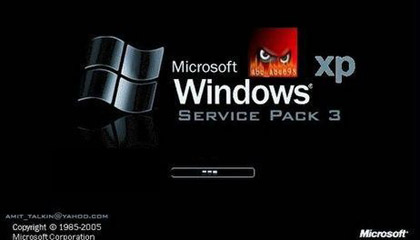"Oh my god, what is it going to be like? My screen goes black once and for all? When I first heard the news I thought it was a scam," said Internet company staffer Chen Shanli, when asked by China.org.cn about Microsoft's recent controversial decision to crack down on Windows XP piracy.

On October 15, Microsoft announced that it would launch WGA and OGA in China next week in order to crack down on the use of pirated software. WGA is an updated service aimed at Windows XP, the biggest piracy victim among Microsoft operating systems. This will be OGA’s first introduction to China, covering users of Office XP, Office 2003 and Office 2007. The announcement has caused consternation among Chinese users, both individual and corporate.
According to various polls carried out by Chinese portals such as Sohu.com, QQ.com, 21cn.com, and many others, more than 60 percent of Chinese Internet users are hostile to Microsoft Windows Genuine Advantage (WGA) and Office Genuine Advantage (OGA) which will warn pirated software users by turning their desktops black or by popping up warning windows every two hours.
On October 16, Ya-Qin Zhang, Microsoft's Corporate Vice-President, told 21st Century Business Herald that Microsoft would not use pre-installation data collected through WAG and OGA to sue anybody at this time. WGA and OGA services are set to help users to identify piracy and then advise them to buy genuine software or take alternative action, Mr. Zhang said. Microsoft would make users choose genuine software through persuasion rather than by litigation. Legal action will be a last resort, added Mr. Zhang.
Many of the Internet users polled complained about the high price of Microsoft software. The price factor is the major reason why they turn to piracy. For instance, Windows XP Professional is sold at the same price in China as in the US, about US$199. Some Internet users say US$199 is far too expensive for a Chinese with an average monthly income of US $1,000 - less than a quarter of the average American salary. The price is completely unreasonable in China. Some Internet users even suspect Microsoft's actions to be a conspiracy against Chinese computer users.
Zhang Yan, a manager of Microsoft Office product marketing said that neither WGA nor OGA is aimed to hit Chinese users, and both of them have operated in the US market for some time. These services can be blocked by turning off Windows "Automatic Updates", through anti-virus programs and firewalls, or by disconnecting from the Internet. Thus it will still be possible to use pirate software after the anti-piracy campaign is launched next week, said Zhang.
Blocking Microsoft's online updating services to eluding WGA and OGA has its drawbacks, however, a software engineer in Beijing told China.org.cn. The veteran computer expert said that turning off "Automatic Updates" can lead to adverse consequences because computers would be more vulnerable to viruses, or incompatible with some of Microsoft's latest software.
Individual users are afraid of having their PC desktops blacked permanently or being aggravated by immovable warning signs.
As for corporate users, their upcoming problems will not be limited to the malfunctioning of work computers. They could possibly face lawsuits from Microsoft and might find themselves having to pay the latter hundreds of thousands of yuan in compensation. One company has reportedly received a letter from Microsoft, stating that the company is using pirate software and threatening to take legal action to protect its rights. This kind of threat is certainly not an empty one. Microsoft can collect pre-installation data through WGA and OGA and use them as hard evidence to litigate against corporate users of pirate Windows. Meanwhile, China's Copyright Law would make it impossible for the latter to win. Large compensation claims could bankrupt the targets.
In August Microsoft filed a complaint against "Tomato Garden", a Chinese piracy website and successfully brought down some producers of pirate software. This is widely viewed as the beginning of Microsoft's crusade against piracy in China. Some people even consider WGA and OGA to be the software giant’s declaration of war against China's pirate users.
Some Chinese software experts applaud Microsoft's actions. "The price factor should not be an excuse for illegal copying and use," claims software expert Yuan Meng in his blog article. He does not see the price of Microsoft software as a problem. Microsoft has lowered the prices of its Office package to 199 yuan (about US$ 29) but sales are still feeble, he notes.
Mr. Yuan also points out that unchecked software piracy has caused significant problems for Chinese software companies. The "Tomato Garden" case has sounded the alarm for users of pirated software -- use of piracy is a crime, he says.
Ni Guangnan, an academician from Chinese Academy of Engineering, holds the same view. He also points out in his blog that piracy is more harmful to domestic software makers than to multi-nationals. The battle against piracy should not be inspired by pressure from international companies like Microsoft, rather it should be motivated by a drive to enhance the development of domestic software manufacturers, he says.
(China.org.cn by Pang Li October 17, 2008)